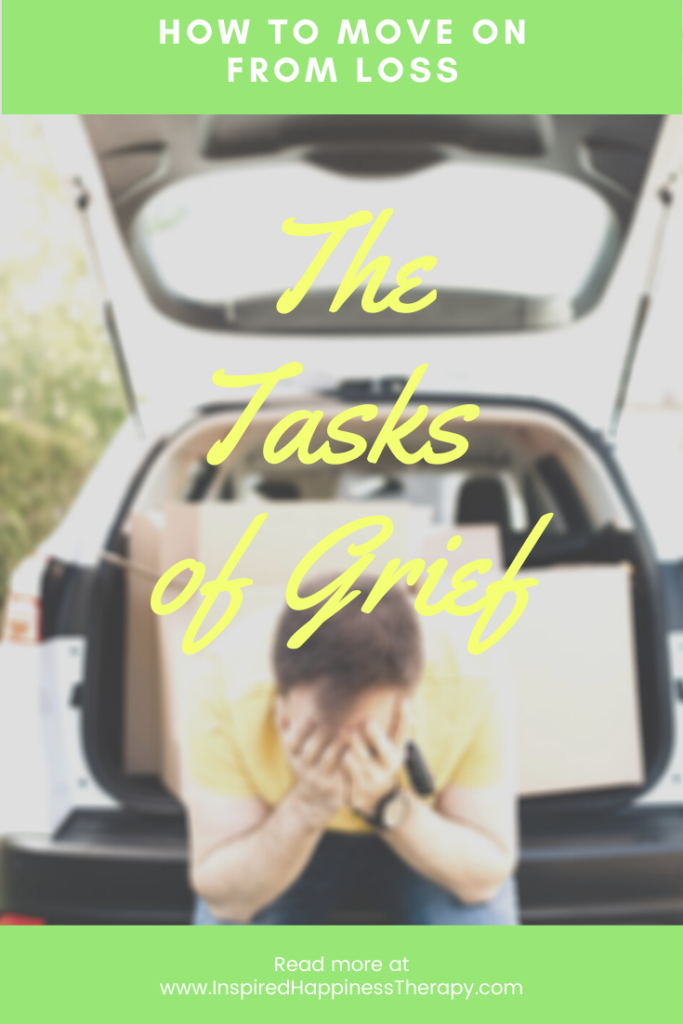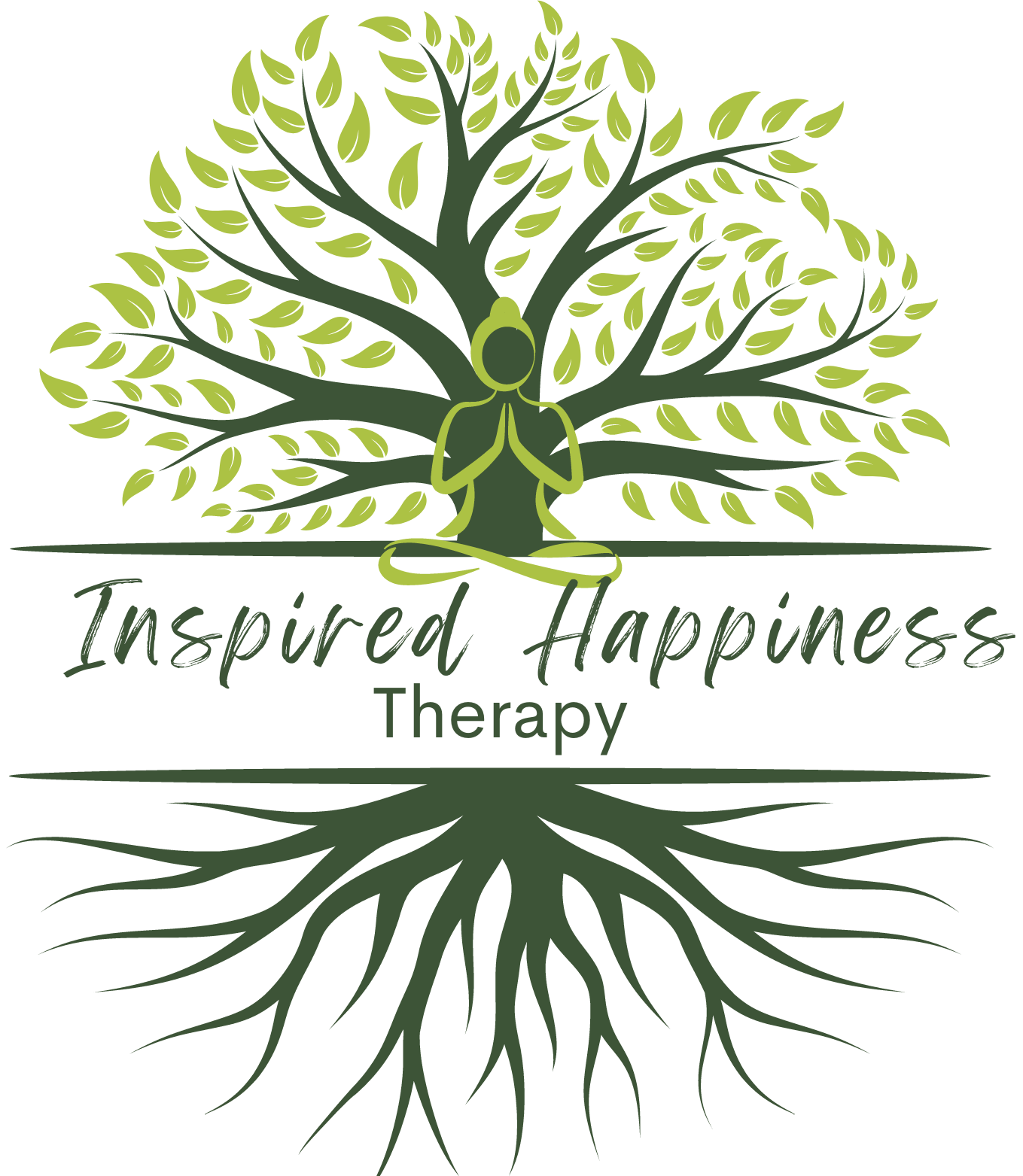
What Is Grief?
We tend to think of grief as a sadness related to death or loss. Grief is actually defined as a reaction to a significant loss. While this loss can be a death, it can also be any type of loss or even life transition. Sadness is also one emotion experienced when we suffer a loss but other emotions like anger, fear, or a sense of numbness are also common.
“No one ever told me that grief felt so like fear.” – C. S. Lewis

The Tasks of Grief
Most people have heard of the “5 stages of grief.” Denial, anger, bargaining, depression, and acceptance have made their way into pop culture. What comes after acceptance though? Much like “happier ever after” in stories, acceptance is a beginning for someone who has moved through grief. Not an ending.
The tasks of grief are the work of psychologist William Worden. Worden believed that grief was not a passive process, as I also believe. “The only way out is through” I often tell my clients when it comes to grieving. Worden theorized a replacement for the stages of grief but I and many other therapists see the tasks of grief as a complimentary process. Once a person has passed through the feelings of denial and anger, has experienced bargaining, depression, and acceptance as well as experienced guilt which typically accompanies the depression phase, the tasks for grief begin.
There are 4 tasks of grief:

Accept the reality of the loss
Many people are confused when they hear that denial is a stage of grief. They say things like “I know he/she is gone, I’m not in denial.” Denial is better described as the feeling of unreality that accompanies a loss. You might forget someone has died and pick up the phone to call them, for example. If you are used to texting someone every day, a breakup can make you feel like you are forgetting something because your routine becomes radically different. The feeling “this can’t be happening” or “this doesn’t feel real” is what denial is all about.
More so than just those feelings of “how can this is happening” accepting the reality of the loss is a step further than grief. You know in your heart that your ex-partner isn’t coming back and you no longer want them to. You adjust to the idea that your deceased parent will no longer be there at holidays. When you accept the reality of a job loss you begin to really want a new job versus wishing you could have your old job back. Acceptance is not being happy with reality, just truly knowing there’s no changing it and being ok with that.

Experience the Pain
You can never move through grief if you refuse to feel. The pain might feel like sadness, anger, fear, or a mixture of emotions. You might cry, you might want to throw things, perhaps you feel like running away. No matter what you feel, you have to allow yourself to feel the feelings if you want to get through the grieving process. Often, people throw themselves into staying busy because they are afraid if they stop and allow themselves to feel that the pain will overwhelm them. Whether you are planning a funeral or going out every night after a breakup, the longer you postpone allowing yourself to feel bad the longer you will be stuck.
When I worked in a hospital setting, people would often say, “he died 20 years ago, I don’t understand why I am still this upset about it.” Then, exploring their grief process it would become obvious they had never given themselves the space to feel. Life is often busy. If you are working, going to school, raising a family, pursuing a time consuming hobby, whatever you are doing if you do not allow yourself down time after a loss you are probably not allowing yourself to truly experience the pain of the loss. Modern life does not give us the time and space to feel bad. Even when I worked in hospice, the employees were only given one day off for the death of a close family member like a spouse or child and no time for more relatives like an aunt or uncle. It takes more than one day of sadness at a funeral to move through grief.

Reinvest in the new reality
Just like you need to give yourself enough time to feel pain, you do not want to spend too much time isolating and refusing to move on. Investing time and energy into a reality without whatever or whomever you have lost is an important part of beginning to move on from loss. Even if a loved one is deceased, your are not. In most any case, the person lost would not want the person to spend the rest of their life sad and alone. Reinvesting might include getting back to hobbies and friends neglected during a relationship. It might be going back to school to change fields after being laid off. Dating might be a reinvestment in reality of being a newly-single person after a divorce.
I have found that those who have been a primary caregiver for an ailing or dying loved one have a very difficult time moving on to investing in themselves and their future. If you have spent years with your life centered on the care of another, it can be difficult to remember what you enjoyed before. If you are having difficulty moving on, seeking therapy or counseling might be helpful.

Honor the loss
As you move on, especially after the loss of a loved one through death or the end of a relationship, it can be important to honor the loss in some way. Whether you are learning the lesson that you feel is an important takeaway from a breakup or making your grandmother’s recipe at a holiday, honoring our loss acknowledges that we are forever changed. There’s a saying that goes “No man ever steps in the same river twice, for it’s not the same river and he’s not the same man.” Everything we experience – both positive and negative – changes us in some way. It is up to us to decide how to honor these experiences. Even if there is a struggle, we do not just forget what we have experienced. Pretending that a loss did not happen or that what we experienced in that loss was unimportant sends us back into denial which is not a healthy place to be!

Grief Is Part of The Human Experience
If we care for anything, we will grieve at some point. Loss is a part of life and grieving those losses is part of being human. Grief lets us know that something was important to us. Grief asks us to take the time and space to respect that what we lost was important and so is the process of learning to live our life without it. Trying to avoid feeling pain only causes more pain in the long term.
“Grief can be the garden of compassion. If you keep your heart open through everything, your pain can become your greatest ally in your life’s search for love and wisdom.”
– Rumi
Did you enjoy this article or learn something from it?
Use the buttons below to share on social media so that others can find it too!



